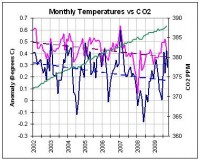By Investor’s Business Daily
Regulation: While a bill that’s intended to cut carbon dioxide emissions wends its way through Congress, an arm of the legislative branch is warning that doing so will have nasty economic consequences.
Douglas Elmendorf, director of the Congressional Budget Office, told members of the Senate Finance Committee Thursday that “Under a cap-and-trade program, consumers” - not demonized corporations, we might add - “would ultimately bear most of the costs of emission reductions.”
This is because industry and other groups (hospitals, schools, any institution that discharges carbon), forced under a federal cap-and-trade regime to buy government permits to release CO2, would pass on their costs to consumers.
Cutting carbon emissions by 15% through this method would cost each American household an average of $1,600 a year, the CBO found. In a worst-case scenario, the cost is $2,200 per household. Current House legislation would carry even heavier economic penalties than the CBO’s model suggests.
Should it become law, it would require that CO2, the greenhouse gas some (but far from all) scientists believe is warming the planet, be cut 20% from 2005 levels by 2020. By 2050, the emissions would have to be 83% below 2005 levels. In light of this, $1,600 a year seems like a bargain.
Elmendorf is no crazed right-wing economist. He was on the Clinton Council of Economic Advisers and worked at the left-leaning Brookings Institution before being named CBO director by Congress’ Democratic leadership. The findings of his office should carry some weight with the Democrats who are pushing hard for legislation to cut CO2 emissions.
Some, particularly those who represent the heartland, might consider the CBO assessment. But Rep. Henry Waxman, the California Democrat who chairs the Energy and Commerce Committee that is looking at a cap-and-trade bill, won’t. Neither will the White House, which is putting pressure on House Democrats to pass legislation quickly. “The president says he wants legislation, he wants us to move as quickly as possible,” Waxman said.
OK, now we’re convinced. The country does need cap-and-trade - preferably a cap placed on the many poor ideas flowing out of Washington and a large-scale trade of the existing political leadership for a fresh class of elected officials who can think straight. Read more here.
Please write and call your congressman especially if your state has one on Waxman’s Energy and Commerce committee and tell them NO on Cap-and-Trade which is really Cap-and-Tax. The membership list is here. The subcommittee in Energy and Environment is here. If your state’s congressman or woman is not on the lists, you should contact them and tell them to vote no if it comes out of committee. Google your congressman’s name and contact the local and DC offices. I have attempted to contact by email and phone Congressman Markey’s office in neighboring Massachusetts who chairs the subcommittee, but was informed that he was unable to respond (listen) to anyone outside his district. Congress is moving the train down the track despite only 34% of the public now believing man is responsible for climate change and the fact that for over 7 years, temperature of the global atmosphere have declined (with data for UAH MSU and CO2 through April) and as in the post just below, ocean heat content has diminished all as CO2 has continued its steady rise.

See larger image here. Sources are University of Alabama MSU satellite lower tropospheric global monthly data, Hadley Center CRUT3v surface monthly temperatures and NOAA’s ESRL Mauna Loa CO2 seasonally adjusted.




